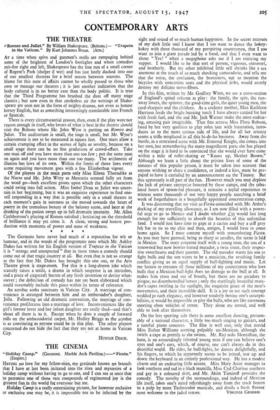THE CINEMA
HAVING no love for my fellow-man, my gratitude knows no bounds that I have at last been initiated into the rites and mysteries of a holiday camp without having to go to one, and I can see at once that to patronise one of these vast compounds of regimented joy is the greatest fun in the world for everyone but me.
Holiday Camp is a really entertaining picture, for however reclusive or exclusive one may be, it is impossible not to be infected by the sight and sound of so much human happiness. In the secret recesses of my dark little soul I know that I too want to dance the hokey- kokey with three thousand of my perspiring countrymen, that I too
want to join a giant parade led by a band, and that I even want to shout " Yes! " when a megaphone asks me if I am enjoying my supper. I would like to be that sort of person, vigorous, extrovert, and brotherly. But my other inhibited little self shrinks like a sea anemone at the touch of so much shocking camaraderie, and tells me • that the noise, the confusion, the breeziness, not to mention the bicycles with concertina seats and the physical jerks, would utterly destroy my delicate nerve-fibres.
In this film, written by Mr. Godfrey Winn, we see a cross-section of England's spinal column at play : the family, the spiv, the run- away lovers, the spinster, the good-time girls, the quiet young men, the card-sharpers and the children. As a cockney mother, Miss Kathleen Harrison feeds the bright burning torch I have always carried for her with fresh fuel, and she and Mr. Jack Warner make the most endear- ing, amusing pair imaginable. That fine actress Miss Flora Robson, fated by her very qualities to play roles taut with frustration, intro- duces us to the more serious side of life, and for all her artistry seems a trifle misplaced in all this hi-de-ho business. Away from the bustle, in a restrained scene with Mr. Esmond Knight, she comes into her own, but remembering the many magnificent parts she has played on the stage it is hard to be convinced that she would ever have come within a mile of roller-skating or " Knees up, Mother Brown."
Although we learn a little about the private lives of some of the inmates of this popular prison, it must be taken into account that anyone wishing to share a confidence, or indeed a kiss, must be pre- pared to have it curtailed by an announcement on the Tannoy. But this apparently is all part of the fun. However much you may deplore the lack of private enterprise fostered by these camps, and the tabu- lated hours of spoon-fed pleasure, it remains a joyful experience to
witness some thousands of not very happy people snatching a brief week of forgetfulness in a beautifully appointed concentration camp. It was distressing that my visit to Fiesta coincided with Mr. Attlee's docking of my travelling allowance, as I am now filled with a power-
ful urge to go to Mexico and I doubt whether £35 would last long enough for me sufficiently to absorb the beauties of this unfamiliar land. I would just have time to gape at a cactus and buy a stiff grey felt hat to tie to my chin and then, amigos, I would have to come
home again. So I must content myself with remembering Fiesta. As you may have guessed, being as sharp as needles, the scene is laid
in Mexico. The story concerns itself with a young man, the son of a renowned but now bowler-hatted matador, a twin sister, their respec- tive sweethearts and their parents. The old matador wants his son to fight bulls and the son wants to be a musician, the resulting family • conflict giving us an equal supply of bull-fighting and music. Let me hasten to reassure all those millions of my countrymen who love bulls that a Mexican bull-fight does no damage to the bull at all. It makes him cross and out of breath, but there are no picadors to picque, no disembowelled horses ; only the startlingly beautiful mata- dor's capes twirling in the sunlight, the exquisite grace of the men's movements, and their incredible skill. It is a joy to see such courage wedded to such elegance, and however tenderly bovine one's suscepti- bilities, it would be impossible to pity the bulls, who are like enormous snorting ebon vehicles of terror. They alone are armed, and well able to look after themselves.
On the less sporting side there is some excellent dancing, presum- ably of a national character, a little too much singing to guitars, and a tuneful piano concerto. The film is well cast, only that nereid Miss Esther Williams seeming palpably un-Mexican, although she twirls a cape as prettily as she swims. Mr. Rid ardo Montalban, the hero, is an astoundingly talented young man if one can believe one's eyes and one's ears, which, of course, one can't always do in this deceitful world. He rides, he bull-fights, he dances delightfully, and his fingers, to which he apparently seems to be joined, tear up and down the keyboard in an entirely professional way. He has a modest charm and an endearing little accent. Miss Mary Astor manages to look southern and sad in a black mantilla, Miss Cyd Charisse southern and gay in a coloured skirt, and Mr. Akim Tamiroff provides the comedy. The novelty of the surroundings, and indeed of Mexican life itself, takes one's mind refreshingly away from the track beaten to a pulp by most Technicolor musicals, and distils a fresh flavour
most welcome to the jaded senses. VIRGINIA GRAHAM.


































 Previous page
Previous page